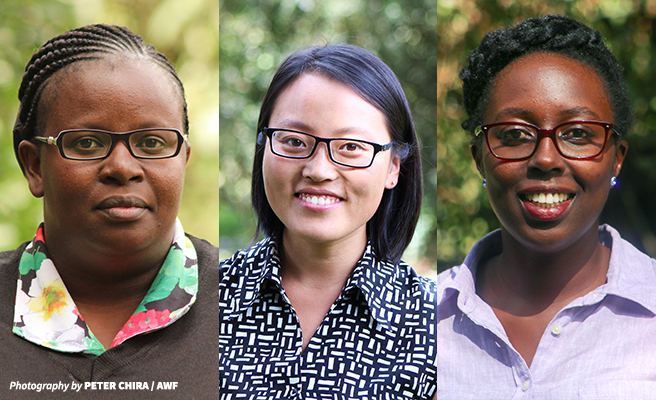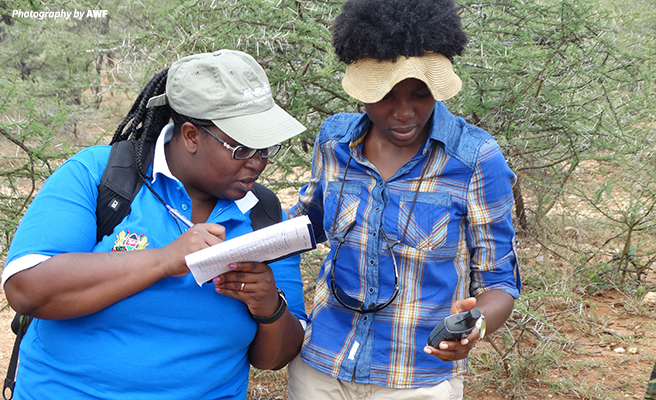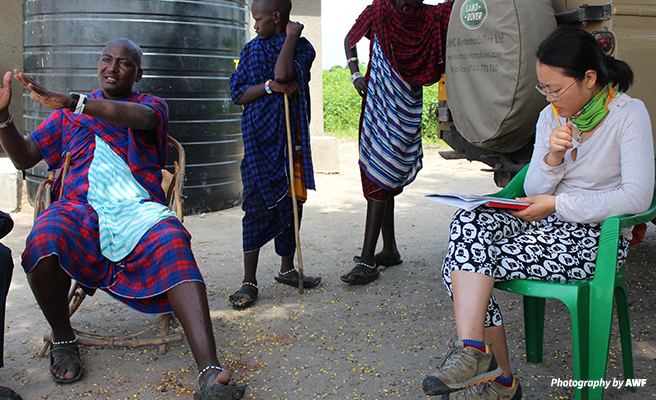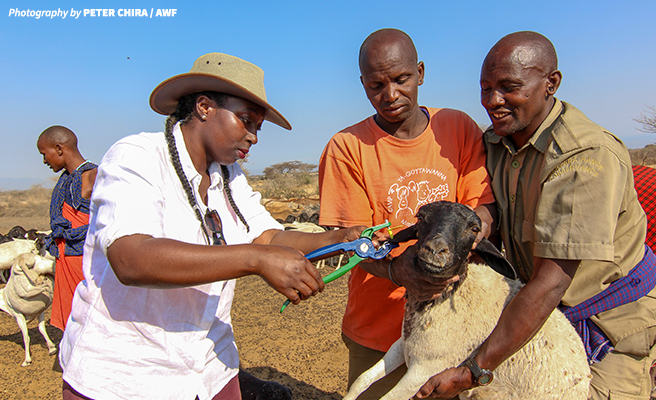AWF Women Champion Conservation in Africa

As AWF Trustee Myma Belo-Osagie wrote in her International Women’s Day blog post at the beginning of the month, women in Africa must step up and engage in conservation on the continent. Without their involvement on today’s most pressing matters—such as sustainable development and economic growth, and how conservation fits into these contexts—she argues that Africa risks being left behind the rest of the world.
AWF does its best to foster women’s participation in conservation, not least through our Conservation Leadership and Management Program (CLMP). The CLMP is a 24-month management training program that provides recent master’s degree graduates the opportunity to learn African conservation firsthand.
Though women are not necessarily given priority in program admissions, we nevertheless make an effort to balance each class with a mix of qualified men and women—all of whom are passionate conservationists.
Take Sylvia Wasige, a Kenyan and former associate who finished the CLMP in 2016. She now works with AWF’s species protection team as a species conservation project officer.
Wasige says she became interested in wildlife at an early age. “I have always loved the outdoors,” she says, though she admits the uniforms were another draw. “I was always fascinated by how the Kenya Wildlife Service rangers, especially the women rangers, dressed and looked in their uniforms. It was a mixture of beautiful and tough at the same time.”
After earning her bachelor’s degree in wildlife management, Wasige decided to pursue a master’s degree in environmental planning and management. “The choice of environmental planning and management was largely influenced by the need to look at wildlife conservation in the broader sphere, as part of the environment,” she says.
Her current position offers a similarly broad perspective, touching on the different programmatic approaches AWF’s species protection team uses to protect priority wildlife populations throughout Africa: conservation science, species protection grants and Canines for Conservation.

Sylvia Wasige (left) collected ecological monitoring data in the field during her intensive CLMP orientation.
Kahembo Odera, who joined the CLMP in 2016 as part of the most recent class, also remembers being passionate about wildlife as a child.
“I was 7 years old,” she recalls, “and witnessed my parents throwing [non-biodegradable] rubbish out of the car window. I was so incensed that they were contributing to the pollution of the world we live in that I screamed for the car to stop. We had to reverse and collect the rubbish that had just been discarded.”
As a young student, Odera participated in local wildlife clubs, and later went on to earn a master’s degree in environmental law. She, too, currently works with AWF’s species protection team as one of a handful of rotations she will experience within the CLMP.
Building a bridge between China and Africa
Jia Qiao, meanwhile, took a different route to finding her interest in conservation in Africa. During her university studies in China, from where this conservation management associate hails, she met a number of students from various African countries on campus.
“I was keen to learn more about their unique cultures and stories from their countries,” Qiao says, “and I was so drawn to Africa’s diversity. This ignited my desire to pursue a career in enhancing communication between China and Africa in the fields of culture and society.”
Following her studies, Qiao interned with the Great Apes Survival Partnership in Nairobi, where she learned about to the enormous threats facing Africa’s great ape populations. The plight of these animals reinforced her passion for conservation.
Seeing both the positive and negative impacts arising from the growing presence of Chinese companies in Africa, Qiao decided she wanted to foster mutual understanding between China and Africa, and collaboration on conservation.

Jia Qiao (far right) hopes to foster collaboration between China and Africa.
“China has emerged as Africa’s largest trading partner since 2000. Chinese companies have invested heavily in Africa and have contributed significantly to economic development there. In some cases, this has put significant pressures on the environment and on ecological systems,” Qiao says.
Now in her second rotation as a conservation management associate, Qiao supports the communications efforts of the office of the president at AWF. She played a major role in organizing AWF President Kaddu Sebunya’s recent trip to China, arranging a series of meetings with key organizations and government institutions.
On her future career goals, Qiao says: “I would like to play a role as a bridge between China and Africa to ensure that they can build a mutually beneficial relationship on the basis of environmental and wildlife conservation.”
‘Nothing we cannot achieve’
All three women have faced their share of challenges working in conservation—a field replete with thorny problems to solve, and which has historically been dominated by men. That hasn’t stopped them, however, from pursuing their goals with enthusiasm.
From Odera’s perspective, women can turn these challenges into strengths. “We tend to have to find several alternative remedies for a problem in order to get ahead,” she explains. “And in most cases, we do find those remedies despite the obstacles in our way.”
Odera adds: “Women are going to change this world. Fact. We are already changing it, and for the better. Conservation in Africa will be championed by women, and I remain hopeful that as long as we continue to fight for our wildlife and wild lands, there is nothing we cannot achieve.”
When asked about where she finds her inspiration, Odera names her mother. “She is not in the field of conservation at all, but I admire how she values her strengths and weaknesses, and how she works with others.
“My other key role model is Wangari Maathai, Kenya’s very own Wonder Woman,” Odera says. “She stood up for the environment and wildlife even at the cost of her own safety and physical well-being. She is the reason Kenya has Uhuru Park, Karura and Mau forests and countless other green spaces today.”
Wasige also cites Wangari Maathai as a role model but mentions a conservation heroine within AWF’s ranks: “Within AWF, I look at Fiesta Warinwa,” she says, referring to the South Sudanese native and longtime AWF employee who has blazed trails as landscape director in two AWF landscapes, as country director for Kenya and now, as director of philanthropy—Africa.
“For me, Fiesta is the epitome of conservation by the African woman, from time spent in rough terrains under the elements and heat of community conservation, partner relations and donor demands to the dinner tables of decision making.”

During her CLMP orientation, Kahembo Odera (left) helped tag livestock at Manyara Ranch in Tanzania.
The next generation of women in conservation
Wasige, Odera and Qiao all had a few words of encouragement to pass on to the next generation of female conservationists in Africa. “If a young girl is really interested in working in conservation in the future, she should stay keen and stay passionate, and at the same time, try her best to seize opportunities to build up a deep understanding of the major issues in conservation,” observes Qiao.
As the mother of two young daughters, one an infant, Wasige notes, “In the past, women in conservation have had to face tough choices between career and family. Times have since changed. It is very possible for women to make choices that will enhance development in all the aspects of life.”
Odera adds, “To any young girl interested in conservation: You have it within you to make a change, even a small one. It means following your passion, and perhaps fighting a little harder than your male counterparts to succeed—but it just means that you have that much more magic to give.”
This post is the third in a series highlighting women’s contributions to conservation in Africa. In the first article, AWF Trustee Myma Belo-Osagie discusses the critical role women play in shaping the continent’s sustainable development, and its future. The second article explores the ways women like AWF’s own Didi Wamukoya are combating wildlife crime in Africa, from the field to the courtroom.